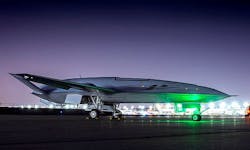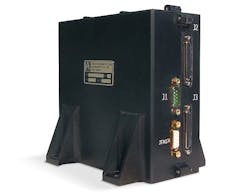Boeing chooses remote I/O mission interface controller from Aitech for MQ-25 unmanned refueler avionics
CHATSWORTH, Calif. – Unmanned aerial vehicle (UAV) experts at the Boeing Co. needed key mission interface systems for the MQ-25 unmanned aerial refueling program. They found their solution from Aitech Defense Systems Inc. in Chatsworth, Calif.
Aitech is providing Boeing Defense, Space & Security segment in St. Louis with an advanced, customized remote I/O interface controller based on the company's commercial off-the-shelf (COTS) Ai-RIO remote interface product.
The MQ-25 is the U.S. Navy's first operational carrier-based unmanned aircraft and is designed to provide a much-needed refueling capability. The contract supports Boeing's engineering and manufacturing development program to provide four MQ-25 aircraft to the U.S. Navy for Initial Operational Capability by 2024.
"The MQ-25 program will help the U.S. Navy extend the range of the carrier air wing, and Boeing and our industry team is all-in on delivering this capability," says Dave Bujold, Boeing's MQ-25 program director.
"Ensuring the success of the unmanned MQ-25 Engineering and Manufacturing Development (EMD) test aircraft requires precision electronics and close-knit cooperation among the companies involved, says Moshe Tal, North American CEO of Aitech Group.
The Ai-RIO is expandable with as many as eight units networked together. Added capabilities include I/O, power switching, and mass/SD FLASH memory.
The remote I/O subsystem includes a Gigabit Ethernet port with precision time sync IEEE-1588 support, 10 RS-422 ports, eight LVDS or RS-422/485 UARTS, four SpaceWire ports with LVDS I/O, two CANbus ports, and 16 GPIO in two blocks of eight.
The Ai-RIO is an high density, low power rugged subsystem that provides user-specific functionality. It is suited for vehicle platform flight control, attitude and navigation controls, servo-valve and thrust vector control (TVC), robotic motor control, video and image processing and storage, data telemetry, platform stabilization, communications and telematics, high speed data recorders, booster and launch propulsion and thruster control, remote sensor and effector monitoring.
Related: Curtiss-Wright awarded contract to support Boeing’s MQ-25 unmanned tanker for the U.S. Navy
Boeing can use the Ai-RIO as a stand-alone command and data handling platform or networked remote command/response I/O unit. It a radiation-qualified dual-core PowerPC processor with two rad-tolerant FPGAs. All internal electronics are conduction-cooled and mechanically fixed and housed within a sealed, EMI/EMC Faraday cage for maximum thermal transfer.
The housing is constructed of 6061/T6 flight-grade aluminum and is based on a common 5.5-by-5.5-by-1.2-inch small form factor. External connectors can be either micro D-Subs for space applications or standard micro MIL-DTL-38999 circular military connectors for use in defense environments. The base unit configuration weight of an Ai-RIO is 3.75 pounds with a power dissipation of less than 12 Watts.
"Aerial refueling is no small task, and this is an exciting innovation that will help extend the range of Navy combat strike fighters currently conducting aerial refueling missions," says Aitech's Tal.
For more information contact Aitech Defense Systems online at www.rugged.com, or Boeing Defense, Space & Security at www.boeing.com.
Ready to make a purchase? Search the Military & Aerospace Electronics Buyer's Guide for companies, new products, press releases, and videos

